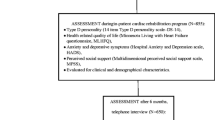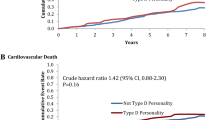Abstract
Background
Identification of cardio-toxic psychological symptoms in coronary artery disease (CAD) patients is important.
Purpose
We examined the association of negative affectivity (NA), social inhibition (SI), and their combination in the distressed (Type D) personality with functional status, fatigue, and mental distress in CAD patients.
Method
Following acute coronary syndrome, 690 consecutive CAD patients agreed to participate in this cross-sectional study and were evaluated for clinical characteristics, including left ventricular ejection fraction (LVEF), and for NA, SI, and Type D personality (i.e., NA and SI; DS14 scale) when they entered a cardiac rehabilitation program in Lithuania. Patient-centered outcomes included functional status (bicycle ergometer), symptoms of fatigue (Multidimensional Fatigue Inventory-20), and mental distress (Beck Depression Inventory–II and Hospital Anxiety and Depression Scale).
Results
The reference subgroup (neither NA nor SI) included 34 % of patients; 13 % had NA only, 19 % had SI only, and 34 % had Type D profile. Type D patients had worse functional status, and Type D patients and NA-only patients had higher symptom levels of fatigue and mental distress. In multivariate regression models that included LVEF, clinical characteristics, and depressive symptoms, Type D personality was an independent predictor of decreased exercise capacity (OR = 1.77, 95 % CI 1.06–2.95, p = .03) and decreased motivation for activity (OR = 3.14, 95 % CI 1.73–5.73, p < .001). Type D, NA, and SI were also independent predictors of mental distress.
Conclusions
Type D personality traits independently predicted poor functional status and worse patient-centered outcomes independently from LVEF and depression. Further studies exploring personality-related differences in cardiovascular outcomes are needed.
Similar content being viewed by others
References
Spertus JA. Evolving applications for patient-centered health status measures. Circulation. 2008;118:2103–10.
Krumholz HM, Peterson ED, Ayanian JZ, Chin MH, DeBusk RF, Goldman L, et al. Report of the national heart, lung, and blood institute working group on outcomes research in cardiovascular disease. Circulation. 2005;111:3158–66.
Smolderen KG, Safley DM, House JA, Spertus JA, Marso SP. Percutaneous transluminal angioplasty: association between depressive symptoms and diminished health status benefits. Vasc Med. 2011;16:260–6.
Lavoie KL, Fleet RP, Lespérance F, Arsenault A, Laurin C, Frasure-Smith N, et al. Are exercise stress tests appropriate for assessing myocardial ischemia in patients with major depressive disorder? Am Heart J. 2004;148:621–7.
Bunevicius A, Stankus A, Brozaitiene J, Girdler SS, Bunevicius R. Relationship of fatigue and exercise capacity with emotional and physical state in patients with coronary artery disease admitted for rehabilitation program. Am Heart J. 2011;162:310–6.
Denollet J. DS14: standard assessment of negative affectivity, social inhibition, and Type D personality. Psychosom Med. 2005;67:89–97.
Denollet J, Schiffer AA, Spek V. A general propensity to psychological distress affects cardiovascular outcomes: evidence from research on the Type D (distressed) personality profile. Circ Cardiovasc Qual Outcomes. 2010;3:546–57.
Versteeg H, Spek V, Pedersen SS, Denollet J. Type D personality and health status in cardiovascular disease populations: a meta-analysis of prospective studies. Eur J Prev Cardiol. 2012 doi:10.1177/1741826711425338
Smith OR, Pedersen SS, Van Domburg RT, Denollet J. Symptoms of fatigue and depression in ischemic heart disease are driven by personality characteristics rather than disease stage: a comparison of CAD and CHF patients. Eur J Cardiovasc Prev Rehabil. 2008;15:583–8.
Simon A, Tringer I, Berényi I, Veress G. Psychological factors considerably influence the results of 6-min walk test after coronary bypass surgery. Orv Hetil. 2007;148:2087–94.
Frasure-Smith N, Lespérance F. Depression and cardiac risk: present status and future directions. Heart. 2010;96:173–6.
Denollet J, Pedersen SS, Daemen J, de Jaegere P, Serruys PW, van Domburg RT. Reduced positive affect (anhedonia) predicts major clinical events following implantation of coronary-artery stents. J Intern Med. 2008;263:203–11.
Davidson KW, Burg MM, Kronish IM, Shimbo D, Dettenborn L, Mehran R, et al. Association of anhedonia with recurrent major adverse cardiac events and mortality 1 year after acute coronary syndrome. Arch Gen Psychiatry. 2010;67:480–8.
Smith TW. Toward a more systematic, cumulative, and applicable science of personality and health: lessons from Type D personality. Psychosom Med. 2011;73:528–32.
The Criteria Committee of the New York Heart Association. Nomenclature and criteria for diagnosis of diseases of the heart and great vessels. 9th ed. Boston: Little, Brown & Co; 1994. p. 253–6.
Smets EM, Garssen B, Bonke B, De Haes JC. The multidimensional fatigue inventory (MFI) psychometric qualities of an instrument to assess fatigue. J Psychosom Res. 1995;39:315–25.
Beck AT, Steer RA, Brown GK. Manual for the beck depression inventory (BDI-II). 2nd ed. San Antonio: The Psychological Association; 1996.
Zigmond AS, Snaith RP. The hospital anxiety and depression scale. Acta Psychiatr Scand. 1983;67:361–70.
Kupper N, Pedersen SS, Höfer S, Saner H, Oldridge N, Denollet J. Cross-cultural analysis of Type D (distressed) personality in 6222 patients with ischemic heart disease: a study from the International HeartQoL Project. Int J Cardiol. 2013 doi:10.1016/j.ijcard.2011.10.084).
Staniute M, Bunevicius R. Evaluation of Type D personality using the DS14 questionnaire. Biol Psychiatr Psychopharmacol. 2011;13:36–7.
Bunevicius A, Staniute M, Brozaitiene J, Stropute D, Bunevicius R, Denollet J. Type D (distressed) personality and its assessment with the DS14 in Lithuanian patients with coronary artery disease. J Health Psychol. 2013 doi:10.1177/1359105312459098).
Fletcher GF, Balady GJ, Amsterdam EA, Chaitman B, Eckel R, Fleg J, et al. Exercise standards for testing and training: a statement for healthcare professionals from the American Heart Association. Circulation. 2001;104:1694–740.
Stankus A. Multidimensional fatigue inventory. Biol Psychiatr Psychopharmacol. 2007;9:86–7.
Bunevicius A, Gintauskiene V, Podlipskyte A, Zaliunas R, Brozaitiene J, Prange Jr AJ, et al. Fatigue in coronary artery disease patients: association with thyroid axis hormones and cortisol. Psychosom Med. 2012;74(8):848–53.
Bunevicius A, Staniute M, Brozaitiene J, Bunevicius R. Diagnostic accuracy of self-rating scales for screening of depression in coronary artery disease patients. J Psychosom Res. 2012;72:22–5.
Grande G, Romppel M, Barth J. Association between Type D personality and prognosis in patients with cardiovascular diseases: a systematic review and meta-analysis. Ann Behav Med. 2012;43(3):299–310.
Stulemeijer M, Andriessen TM, Brauer JM, Vos PE, Van Der Werf S. Cognitive performance after mild traumatic brain injury: the impact of poor effort on test results and its relation to distress, personality and litigation. Brain Inj. 2007;21:309–18.
Lloyd-Jones DM, Hong Y, Labarthe D, Mozaffarian D, Appel LJ, Van Horn L, et al. Defining and setting national goals for cardiovascular health promotion and disease reduction: the American Heart Association's Strategic Impact Goal through 2020 and beyond. Circulation. 2010;121:586–613.
Marin RS. Differential diagnosis and classification of apathy. Am J Psychiatry. 1990;147:22–30.
American Psychiatric Association. Diagnostic and statistical manual of mental disorders (text revision). Washington, DC; 2000.
de Jonge P, Denollet J, van Melle JP, Kuyper A, Honig A, Schene AH, et al. Associations of type-D personality and depression with somatic health in myocardial infarction patients. J Psychosom Res. 2007;63:477–82.
Michal M, Wiltink J, Till Y, Wild PS, Münzel T, Blankenberg S, et al. Type D personality and depersonalization are associated with suicidal ideation in the German general population aged 35–74: results from the Gutenberg Heart Study. J Affect Disord. 2010;125:227–33.
Mainio A, Hakko H, Räsänen P, Timonen M. Cardiovascular diseases among suiciders: a population-based study in Northern Finland population. Cardiovasc Psychiatry Neurol. 2013 doi:10.1155/2010/302102).
Acknowledgments
This research was funded by a grant (LIG-03/2011) from the Research Council of Lithuania.
Author information
Authors and Affiliations
Corresponding author
Rights and permissions
About this article
Cite this article
Bunevicius, A., Brozaitiene, J., Staniute, M. et al. Decreased Physical Effort, Fatigue, and Mental Distress in Patients with Coronary Artery Disease: Importance of Personality-Related Differences. Int.J. Behav. Med. 21, 240–247 (2014). https://doi.org/10.1007/s12529-013-9299-9
Published:
Issue Date:
DOI: https://doi.org/10.1007/s12529-013-9299-9




